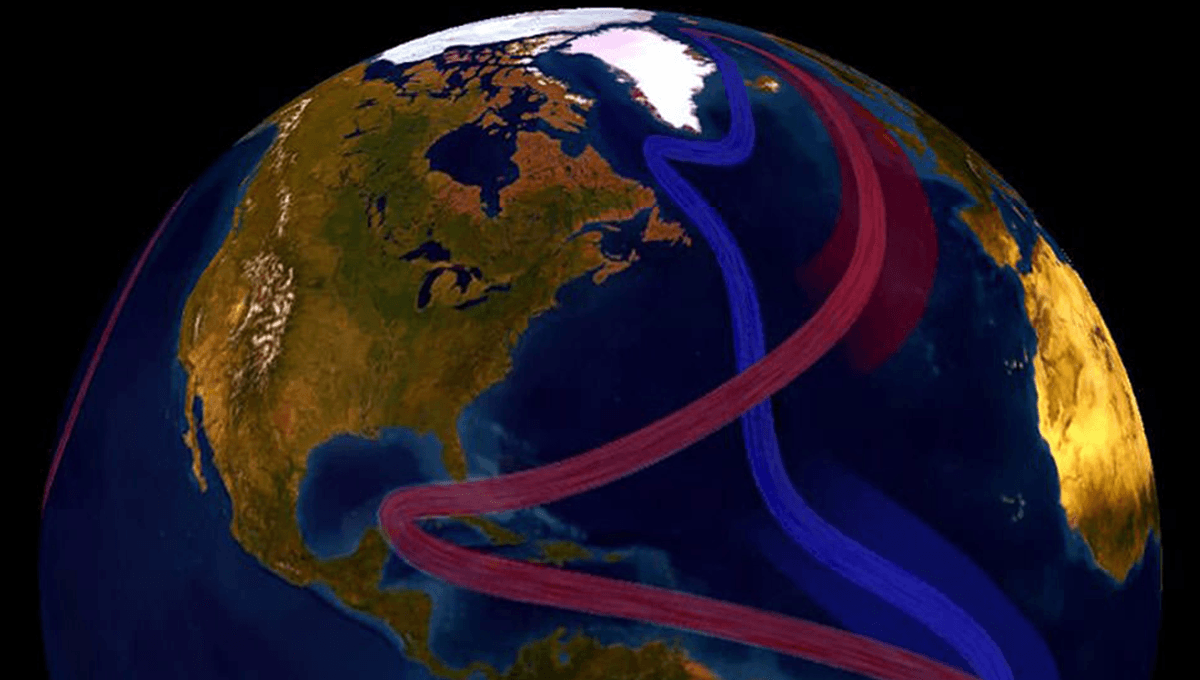
Climate scientists have signed an open letter to the Nordic Council of Ministers, warning of catastrophic consequences that could impact “the entire world for centuries to come” if the slowing of the Atlantic Meridional Overturning Circulation (AMOC) is not addressed.
The world’s oceans are constantly circulated by currents, with those from the surface down to the ocean floor driven by changes in temperature and salinity. Over long timescales, these “global conveyor belts” move water, and nutrients necessary for life, around the planet. The AMOC carries warm and salty surface water from the tropics and through the North Atlantic.
“The circulation process begins as warm water near the surface moves toward the poles (such as the Gulf Stream in the North Atlantic), where it cools and forms sea ice. As this ice forms, salt is left behind in the ocean water,” the National Oceanic and Atmospheric Administration (NOAA) explains. “Due to the large amount of salt in the water, it becomes denser, sinks down, and is carried southwards in the depths below. Eventually, the water gets pulled back up towards the surface and warms up in a process called upwelling, completing the cycle.”
The warmer water delivered to the Arctic region is key to keeping Europe mild and the tropics warm, with possible dire consequences if the AMOC were to slow significantly. In the letter, published on Monday, 42 leading scientists highlighted the risk to conditions in the Arctic region if the AMOC passes key tipping points. This is where critical thresholds are exceeded, leading to significant and possibly irreversible change.
“Science increasingly confirms that the Arctic region is a ‘ground zero’ for tipping point risks and climate regulation across the planet,” the scientists explain in their letter.
“In this region, the Greenland Ice Sheet, the Barents sea ice, the boreal permafrost systems, the subpolar gyre deep-water formation and the Atlantic Meridional Overturning Circulation (AMOC) are all vulnerable to major, interconnected nonlinear changes. The AMOC, the dominant mechanism of northward heat transport in the North Atlantic, determines life conditions for all people in the Arctic region and beyond and is increasingly at risk of passing a tipping point.”
Recent studies have suggested that the AMOC is on course for collapse, though it is difficult to pinpoint exactly when this will happen. Some have suggested, though controversially, that it could even happen within decades.
The scientists reference the recent IPCC report which concluded that “there is medium confidence that the Atlantic Meridional Overturning Circulation will not collapse abruptly before 2100, but if it were to occur, it would very likely cause abrupt shifts in regional weather patterns, and large impacts on ecosystems and human activities.” However, based on recent research, they say that the IPCC has underestimated the risk and that passing the tipping point is indeed possible within the next few decades.
The scientists fear that, as well as risk of collapse within our lifetimes, collapse could be triggered this century, with the consequences playing out in the next. Given the risks involved, they are calling for urgent action from policymakers before tipping points can be crossed.
“The impacts particularly on Nordic Countries would likely be catastrophic, including major cooling in the region while surrounding regions warm. This would be an enlargement and deepening of the ‘cold blob’ that already has developed over the subpolar Atlantic Ocean, and likely lead to unprecedented extreme weather,” the letter explains. “While the impacts on weather patterns, ecosystems and human activities warrant further study, they would potentially threaten the viability of agriculture in northwestern Europe.”
The consequences of the collapse of the AMOC would not be limited to Europe, with possible impacts including reduced carbon dioxide uptake by the oceans, further contributing to climate change, as well as rising sea levels along the American Atlantic coast.
While significant effort will need to happen globally in order to stop the climate from crossing this and other significant tipping points, as the scientists point out, “adaptation to such a severe climate catastrophe is not a viable option.”
Source Link: Climate Scientists Call For Urgent Action Before "Catastrophic" Collapse Of The AMOC